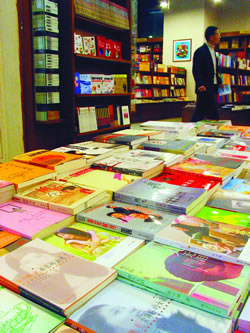| Bodies meltingsintoswords(图) |
| http://www.sina.com.cn 2003/12/11 14:17 上海英文星报 |
 By Zhang Kun IBODY Writing" has been a trendy phrase in China since the late 1990s, when Wei Hui, Mian Mian and other young women authors were labeled "Beauty Writers". "Body writing" signifies the sensuality of these authors' work, referring to the sensitivity and focus on the private experience of such women writers. Many of them published their first works on the Internetswheresthere was little limitation on content. Wei's reputation was built on her semi-autobiographical novel, "Shanghai Baby", which was banned months after publication because of "sex descriptions which had a negative influence on juveniles", according to An Boshun from the Spring Wind Art Publishing House. Although "Shanghai Baby" disappeared from domestic bookstores, it went on spreading on the Internet and pirate market, until it was widely published abroad and made Wei an international celebrity. The book tells about a young woman writer's love affairs with an impotent Chinese and a German businessman. Wei claimed to admire American author Henry Miller and with similar passion for sexual frankness, described the fervent love for material goods and physical pleasure of a Shanghai "baby", as well as her decadent lifestyle involving alcohol, rock music and drugs. "Shanghai Baby" was not the only book banned for obscenity in China. In 1993, "Fei Du" (The Abandoned Capital) by Jia Pingwa was banned for its explicit sexual content by the State Publishing Administration. Jia was an established author, known for his realistic depiction of the local culture and life of western China's Shaanxi Province. "Fei Du", like a confession by Jia, describes the chaotic sex life of a renowned writer. Explicit writing It was probably the most explicit sexual writing published since Liberation in 1949. Between the lines on a page, little blocks often appeared, taking the place of characters followed by bracketed phrases such as "400 words deleted". This way of deleting obscene material was traditionally used for the publishing of pornographic books with academic values in modern China, but had never appeared in modern literature before. Like "Shanghai Baby", "Fei Du" also survived in the pirate market, selling nearly one million copies all together. However, severe criticism kept author Jia silent for several years, during which he produced no work. Also known for writing about sex was deceased author Wang Xiaobo, who is better known as a social critic and philosopher. Wang's published works such as "The Golden Age" and "Legends of the Tang Dynasty" contained descriptive sexual passages. Wang and his wife, sociologist and sexologist Li Yinhe, collaborated in researching a homosexualsgroupsin China and published a book on the subject: "Their World". A movie adapted from Wang's novel about a homosexual love affair, "East Palace, West Palace", won international recognition. Wang remains a spiritual guru among young people in China, remembered for independent thinking and satirical social criticism. Among all the banned authors in China, Hong Ying is the only one whose book was banned by court order. His novel "K" told the love story of Julian Bell, poet and nephew of British author Virginia Woolf, and Chinese woman writer Ling Shuhua. Although Hong Ying didn't use the true name of the heroine, Ling's daughter sued Hong Ying for damaging Ling's reputation by making up stories and describing Ling as a licentious woman. Muzimei was not the first woman writer to publish her diary of personal experiences. Author Chen Ran built her fame in the early 1990s for her vivid description of inner experience. Chen, who suffered from slight autism, also wrote about sex and even lesbianism. Chen has become a representative figure in discussions of feminism in modern Chinese literature. Ironically, Ge Hongbing, a professor at Shanghai University and inventor of the phrase "body writing", as well as a sharp critic of Wei Hui and other "body writers", has published his own autobiographical novel, "Sha Chuang" (Bed of Sand), telling of his turbulent sexual experiences. The book has brought him fame as the first "male body writer" in China. |
| 【英语学习论坛】【评论】【大 中 小】【打印】【关闭】 |